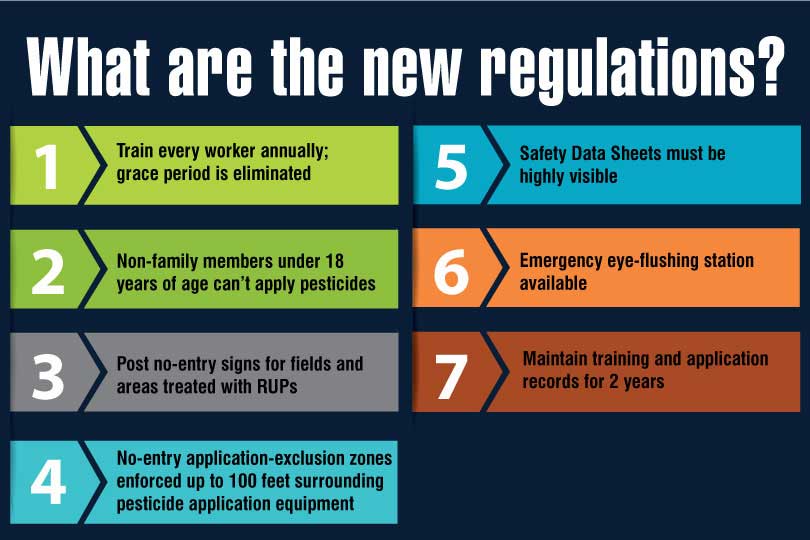By Shala Watson
Staff Writer
Agricultural chemicals and pesticides are one of the essential tools for managing weeds, insects and other pests on the farm. The safe application and storage of the chemicals is equally important.
And new regulations, known simply as Worker Protection Standards (WPS), governing the safe handling and use of agricultural chemicals by farm workers will go into effect Jan. 1, 2017.
The Environmental Protection Agency (EPA) claims the revision was needed to afford farmworkers the same protections as other industries.
“The revised standards may impact every farmer and rancher. However, those with the greatest exposure will likely be larger fruit and vegetable growers, citrus producers and the nursery and greenhouse operators,” said Jay Bragg, Texas Farm Bureau associate director of Commodity and Regulatory Activities.
The new WPS will require farmers to train every worker annually and eliminates a five-day grace period that had been afforded in the previous WPS.
Additional recordkeeping requirements have also been added.
“Now, before workers ever step out onto the farm, they will need to have the required training. This training will need to be documented and kept on file,” Bragg said.
The rule also prohibits non-family members under the age of 18 from applying pesticides and introduces a number of new notification and posting requirements on-farm.
Those include posting no-entry signs for fields and areas treated with restricted-use pesticides until residues decline to a safe level. No-entry application-exclusion zones also will be enforced up to 100 feet surrounding pesticide application equipment to protect workers and others from exposure to pesticide overspray. Safety Data Sheets for each product used must be posted in a highly visible location.
The rules also include changes in personal protective equipment specifications and stipulates that specific amounts of water be available on-farm for routine washing and emergency washing. An emergency eye-flushing station must be available for pesticide handlers at pesticide mixing/loading sites.
Bragg said most of the non-training elements will go into effect January 2017. Because new training materials for the rule are still in development, many of the training-related components will not be implemented until January 2018.
“In drafting the new standards, EPA failed to demonstrate any quantifiable benefits for new WPS. Unfortunately, comments filed by Texas Farm Bureau and other agricultural organizations fell on deaf ears,” Bragg said. “Farmers, ranchers and agricultural employers need to be aware of these new regulations so they can assess changes that may need to be made to their operations.”

